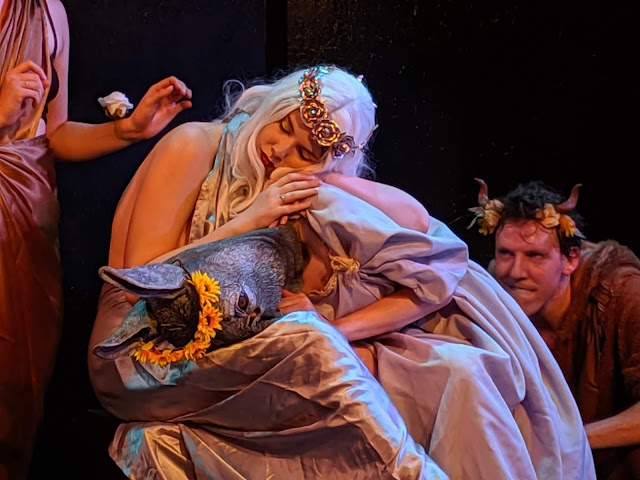Review: "Go Puck Yourself" Dreams a Queer Midsummer Night's Dream
Go Puck Yourself: A Shakesqueer Comedy
Adapted by Chris Weigandt and Genny Yosco
Directed by Genny Yosco
Presented by FRIGID New York and Sour Grapes Productions at The Kraine Theater
85 E 4th St., Manhattan, NYC
July 18-August 4, 2019
 |
| Genny Yosco, Dorie Casper, Andy McCain. Photo credit: Matthew Sears. |
 |
| Elizabeth Claflin, Matthew Zimmerman, Jenny O'Connell, David Yurch. Photo credit: Matthew Sears. |
As the comic complications unfold, classically-inspired, jewel-toned costumes helpfully color-code the sets of lovers, with Oberon and Titania appropriately draped in gold and silver, respectively. Oberon and Titania are more and more directly involved in the action of the human plots than in many productions, which is an especially fruitful decision in a late appearance by Titania that creates a nice link among all of the plots while leaving her motivations elegantly implied. Other interpretively fertile decisions include doubling a trio of faeries and mechanicals and having the female Bottom play, in the mechanicals' amateur Pyramus and Thisbe, the male Pyramus and the male Francis Flute (McKylin Rowe, who doubles Mustardseed) play the female Thisbe. While this can be seen as playing with all-male early modern casting practices (again bound up in policing women's sexuality), it also connects directly to Puck's ultimate destabilizing of gender boundaries: twice he remarks that all mortals look alike to him (comments which one can read back into his previous references to a sleeping Hermia as a "boy"). Demetrius and Hayden's previous betrothal both avoids any possibly problematic readings around the enchanted flower juice and sexual orientation and allows Demetrius to be read as bisexual, an orientation that remains underrepresented in popular media and subject to erasure. Go Puck Yourself exhibits less modernizing departure from and self-reflexive commentary on Shakespeare's text than Sour Grapes' 2018 As He Likes It: A Shakesqueer Comedy (which we reviewed here), but there are still some comparable additions, such as Titania's funny aside wondering why Oberon has to use a bunch of magic and trickery instead of just having a conversation.
 |
| Andy McCain, Katelynn Kennedy Staggs. Photo credit: Matthew Sears. |
In a black-box rendition of an often spectacle-oriented play, the actors create the moments that come to the fore. O'Connell and Claflin establish so palpable an eye-contact-laden chemistry between Hermia and Lyra (who also gets to carry a sword) that it almost undercuts Hermia's chastity-preserving insistence that Lyra sleep further off in the forest. McCain brings an energetic physicality to Puck, and Bob Rutan's Peter Quince comes across as "the adult in the room" for the mechanicals' rehearsal and lends a very naturalistic cast to the Shakespearean dialogue. As Bottom, Casper's consistent mispronunciation of "Pyramus" as though it were a city in New Jersey is a funny running joke, and she manages to be pretty expressive from beneath a rubber donkey head. Rowe's expression of Flute's happiness that he may not have to play Thisbe in public after all is a well-executed comic moment, as are Canali's demonstration of Snug the joiner's clear belief that she nailed the part of the Lion and Katelynn Kennedy Staggs's contrasting reaction to the onstage audience's critiques of Snout as the Man in the Moon, while Yurch engages in some laugh-out-loud physical comedy as Demetrius battles Lyra over Hayden.
When Bottom awakens again in human form, she plans to transform what she thinks of as her dream into a ballad to be sung in a play. Go Puck Yourself performs a not-dissimilar transformation, reinventing an existing Dream for a new theatrical context and suggesting that it indeed has no bottom.
-John R. Ziegler and Leah Richards



Comments
Post a Comment